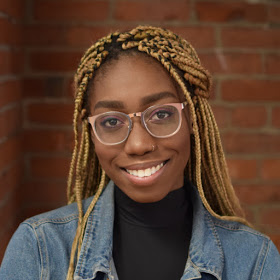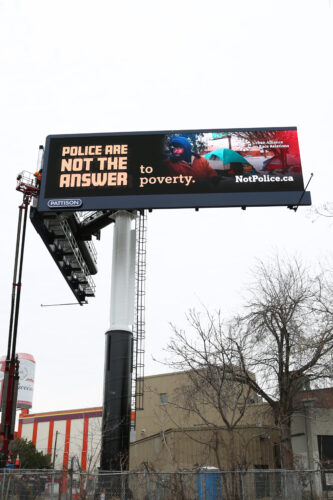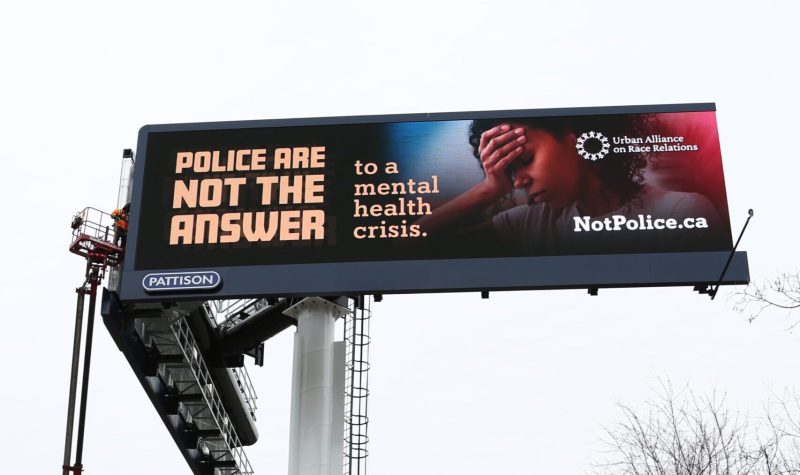The Urban Alliance on Race Relations (UARR) is a non-profit organization offering educational programs and research that are critical in addressing racism in society. Their work reaches the community, private and public sectors across the Greater Toronto Area. Their latest endeavour is the Police Are Not The Answer campaign which calls on municipalities to reallocate police budgets towards community initiatives. The UARR racial equity in education project coordinator, Lily Obeng, shares more about the campaign and the premise of defunding the police.
“These kinds of movements are meant to centre love and a love of community. And a deep care for those that are most vulnerable among us.… Policing is completely incompatible with honouring and doing justice for Black and Indigenous folks in this country. The history of policing in Canada is founded on slave patrols and corralling Indigenous folks,” she explains.
The campaign involves a series of billboards on the Gardiner Expressway, near the Exhibition GO station, stating that the police are not the answer to scenarios like poverty, mental health crises and school safety. Amidst the positive response, the billboards have led to complaints and criticisms flooding the UARR email inbox and social media platforms.

Lily Obeng, UARR racial equity in education project coordinator | Photo courtesy of Urban Alliance on Race Relations
While the billboards are upsetting some, they speak to issues that are already being discussed within the community. The campaign’s three areas of focus have seen multiple protests, community-led phone zaps and media attention in tandem with the Black Lives Matter movement. Obeng adds that in Hamilton, there are ongoing protests to defund the police and stop criminalizing unhoused people.
The timing along with the messaging were intentional seeing as many municipalities are finalizing their 2021 budget right now. Obeng explains that this makes it an ideal time for community members to call for defunding the police. In 2020, the City of Toronto operational budget was $13.5 billion and $1.076 billion of this was allocated to Toronto Police Services. This was a $40 million or 3.9 percent increase in the police budget of 2019. Toronto’s police budget is significantly higher than other public services such as transit, shelters, libraries and more. As the 2021 budget is being discussed, UARR is calling for a shift in budgeting priorities. Obeng recalls earlier efforts in the summer that went in the opposite direction.
“At this point we actually have the capacity to influence or tip a decision in favour one way or the other. Specifically in Toronto, the opportunity to discuss reducing the police budget by 10% came up earlier, and that failed. And instead they decided to give them more money for body cameras. So I think this is the opportunity to really start to dispel the common myths and misunderstandings with regards to defunding the police,” Obeng says.
While discussing misunderstandings, she mentions that the work does not stop when money is taken out of police budgets. From there it must be reinvested in community-based initiatives. She adds that anti-Black racism is woven into other sectors and this reality must also be acknowledged when money is reinvested. She uses the example of school safety and the removal of School Resource Officers to illustrate this point.
“Just because we remove the security guards, doesn’t mean that we’ve removed surveillance practices. It doesn’t necessarily mean that we’ve stopped sharing sensitive information with police officers who will use that information to further criminalize racialized students,” she explains.
Obeng looks toward abolitionist thinkers for the way forward. With this in mind, she hopes that the reinvested money will go towards existing mutual aid efforts that would benefit from greater funding and formal support. These efforts are becoming more common as communities create ways to support themselves where government support is not available. She explains that these mutual aid efforts already have the reach and the connections, investments from the city would simply allow them to expand their work. By reallocating the police budget in this way, Obeng believes that the community would be better prepared to handle the campaign’s topics: mental health crises, school safety, and poverty.

Police are not the answer to poverty billboard | Photo courtesy of Urban Alliance on Race Relations
In addition to the billboards, UARR’s current campaign includes a survey and petition. Community consultation is at the heart of UARR so they are collecting community opinions and views on policing. The petition will allow them to connect with like-minded individuals and keep the public updated on the progress of the campaign and volunteer opportunities. As Obeng discusses the importance of this campaign’s message and timing, she also acknowledges that it is one piece to a very large puzzle.
“The system doesn’t want folks to see the ways in which the system can be changed. I think we always have to strike a balance between working within systems and working to create our own alternative systems to these kinds of oppression. But right now we have the capacity to interrupt and start to move the needle in a direction that we want it to be positively going in."
To hear more, listen to the interview below.


